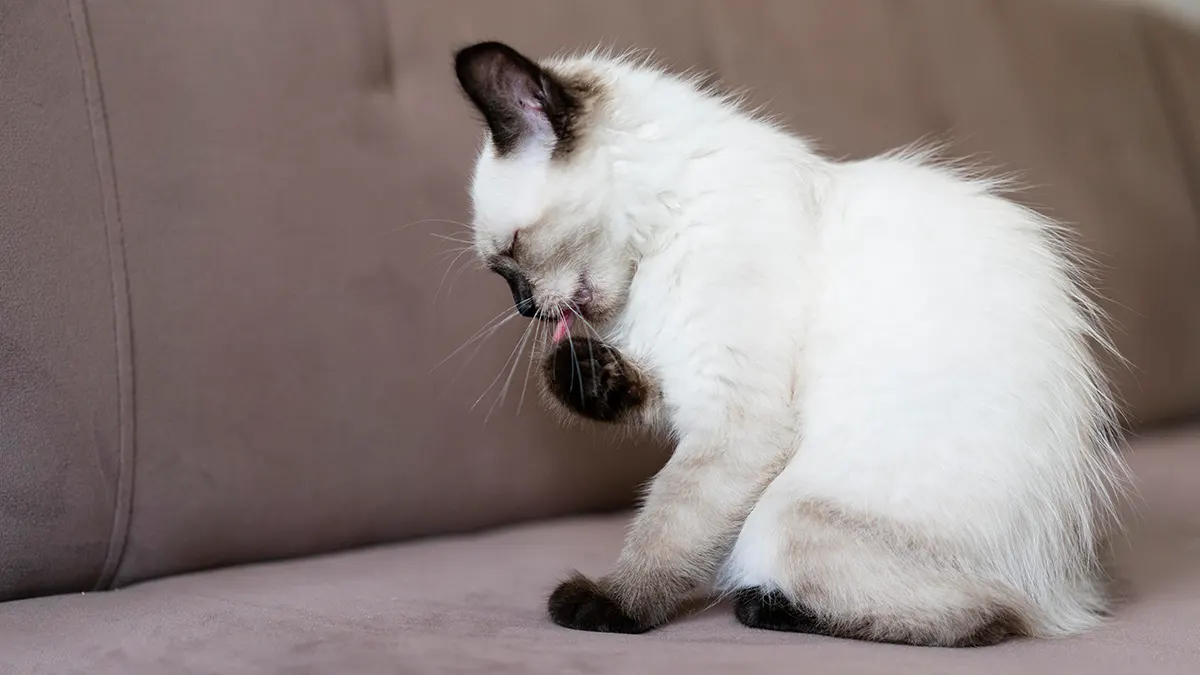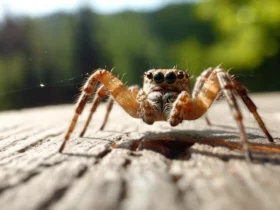If you’ve noticed your feline friend constantly itching and licking, you might wonder: why is my cat itching and licking so much? This behavior can be concerning and may indicate an underlying issue that needs attention. In this article, we will explore the common reasons behind excessive itching and licking in cats, and offer guidance on how to address these concerns to ensure your cat stays healthy and comfortable.
Table of Contents
Common Reasons Behind Excessive Itching and Licking in Cats
- Fleas and Parasites
One of the most common reasons why your cat is itching and licking so much is due to fleas or other parasites. Even a single flea bite can cause intense itching, leading your cat to over-groom, scratch, or bite at its skin. Cats may also be prone to ticks, mites, or lice, all of which can cause similar symptoms. Signs of Flea Infestation:
- Small black specks (flea dirt) in your cat’s fur
- Visible fleas or flea eggs on the skin
- Intense scratching around the neck and back Treatment: A thorough flea treatment plan, including medicated shampoos, topical flea preventatives, and possibly oral flea medications, will help control the infestation. It’s also important to clean your home to prevent re-infestation.
- Allergies
Just like humans, cats can suffer from allergies, which might be the reason why your cat is itching and licking so much. Allergies can be triggered by various factors, including food, environmental allergens (like pollen or mold), or even chemicals found in cleaning products or cat litter. Types of Cat Allergies:
- Food Allergies: These are usually triggered by specific proteins in your cat’s diet. Common culprits include chicken, beef, or dairy.
- Environmental Allergies: Dust, pollen, mold, or chemicals may cause your cat to have allergic reactions, resulting in itching and excessive licking.
- Contact Allergies: Your cat might be allergic to certain surfaces, fabrics, or grooming products that they come into contact with. Signs of Allergies:
- Red, inflamed skin, often seen around the face, ears, and paws
- Excessive licking, particularly on the belly or legs
- Sneezing, watery eyes, or respiratory issues (in the case of environmental allergies) Treatment: Consult your veterinarian for allergy testing. Depending on the cause, you may need to change your cat’s diet, modify the environment, or use allergy medications.
- Skin Infections
Another possible reason why your cat is itching and licking so much could be due to skin infections, either bacterial or fungal. When a cat’s skin is compromised (often from excessive scratching or licking), it becomes more susceptible to infections. Signs of Skin Infections:
- Red, swollen patches of skin
- Oozing or crusting sores
- Hair loss around the affected areas
- A foul odor from the skin Treatment: If you suspect a skin infection, your vet may prescribe antibiotics or antifungal medications. It’s essential to follow the prescribed course to ensure the infection clears up completely.
- Dry Skin
Dry skin can be a source of irritation for cats, leading them to itch and lick excessively. This could be due to weather changes, poor diet, or underlying medical conditions such as hypothyroidism or diabetes. Signs of Dry Skin:
- Dandruff or flaky skin
- Frequent scratching
- A dull, lackluster coat Treatment: Ensure your cat is getting a balanced diet rich in essential fatty acids, which can help improve skin and coat health. You may also want to consider using a humidifier during dry months to add moisture to the air.
- Anxiety and Stress
In some cases, the reason why your cat is itching and licking so much could be behavioral. Cats that experience anxiety or stress may resort to excessive grooming as a coping mechanism. This behavior is known as psychogenic alopecia and is often triggered by changes in the environment, new pets, or household disruptions. Signs of Stress-Induced Itching:
- Over-grooming, especially around the belly, thighs, and legs
- Bald spots where the fur has been licked off
- Hiding, aggression, or changes in eating habits Treatment: Addressing the root cause of your cat’s anxiety is crucial. Try to create a calm, stable environment for your pet. You can also speak to your vet about anti-anxiety treatments or calming aids like pheromone diffusers.
- Hormonal Imbalances
Hormonal conditions, such as hyperthyroidism or Cushing’s disease, may also explain why your cat is itching and licking so much. These conditions can disrupt the balance of your cat’s body, leading to hair loss, itching, and other skin issues. Signs of Hormonal Imbalances:
- Unexplained weight loss or gain
- Lethargy or hyperactivity
- Changes in appetite or thirst Treatment: A veterinarian will conduct blood tests to diagnose hormonal imbalances and provide appropriate treatment, which may include medication or dietary changes.
How to Help Your Cat Feel Better
If you’re wondering, “why is my cat itching and licking so much,” it’s important to consult with a veterinarian for a proper diagnosis. Here are a few steps you can take in the meantime:
- Check for Parasites: Regularly inspect your cat for fleas, ticks, and other parasites, especially if they go outdoors. Use flea prevention products recommended by your vet.
- Feed a Nutritious Diet: Ensure your cat is eating a high-quality, balanced diet that supports their skin and coat health.
- Keep Their Environment Clean: Regularly wash bedding, vacuum carpets, and keep litter boxes clean to reduce exposure to environmental allergens.
- Monitor Stress Levels: Provide a safe, calm space for your cat. Avoid drastic changes in their environment, and give them plenty of attention and enrichment activities.
When to See a Veterinarian
If your cat’s itching and licking are persistent and you can’t figure out why, it’s time to consult a vet. A vet will help identify the root cause and recommend the best course of treatment. Early intervention is essential to prevent complications, such as skin infections or hair loss, that can arise from constant scratching and licking.
Conclusion
As a cat owner, it’s natural to worry when your pet displays unusual behavior, such as excessive itching and licking. The underlying causes can range from simple issues like fleas or dry skin to more complex problems like allergies or hormonal imbalances. By observing your cat’s symptoms and seeking veterinary care, you can address the issue promptly and ensure your furry companion remains happy and healthy. So, if you’ve been asking yourself, why is my cat itching and licking so much, rest assured that there are solutions available to help your cat feel more comfortable and stop the itching cycle.








Your point of view caught my eye and was very interesting. Thanks. I have a question for you.
Your point of view caught my eye and was very interesting. Thanks. I have a question for you.
Thank you for your sharing. I am worried that I lack creative ideas. It is your article that makes me full of hope. Thank you. But, I have a question, can you help me?
I don’t think the title of your article matches the content lol. Just kidding, mainly because I had some doubts after reading the article.
Your article helped me a lot, is there any more related content? Thanks!
Your point of view caught my eye and was very interesting. Thanks. I have a question for you.
I don’t think the title of your article matches the content lol. Just kidding, mainly because I had some doubts after reading the article.
kUMCACO vSVfmw Aca jcAwR OYu kHSbcS LkA
Thanks for sharing. I read many of your blog posts, cool, your blog is very good.
Thanks for sharing. I read many of your blog posts, cool, your blog is very good.
Thank you for your sharing. I am worried that I lack creative ideas. It is your article that makes me full of hope. Thank you. But, I have a question, can you help me?
Love the breakdown-JiliPH really simplifies the thrill of online gaming. The variety of slots and smooth interface make it a go-to for casual players. Check out Jili777 ph for a stress-free yet exciting experience!
I don’t think the title of your article matches the content lol. Just kidding, mainly because I had some doubts after reading the article.
Thank you for your sharing. I am worried that I lack creative ideas. It is your article that makes me full of hope. Thank you. But, I have a question, can you help me?
Thank you for your sharing. I am worried that I lack creative ideas. It is your article that makes me full of hope. Thank you. But, I have a question, can you help me?
Great breakdown! For those looking to apply such strategies in real play, platforms like Jili Online offer engaging games with AI support to sharpen your edge-worth checking out for serious players.
Thank you for your sharing. I am worried that I lack creative ideas. It is your article that makes me full of hope. Thank you. But, I have a question, can you help me?
Thanks for sharing. I read many of your blog posts, cool, your blog is very good.
Thanks for sharing. I read many of your blog posts, cool, your blog is very good.
Can you be more specific about the content of your article? After reading it, I still have some doubts. Hope you can help me.
Your article helped me a lot, is there any more related content? Thanks!
Can you be more specific about the content of your article? After reading it, I still have some doubts. Hope you can help me. https://www.binance.com/lv/register?ref=B4EPR6J0
Your point of view caught my eye and was very interesting. Thanks. I have a question for you.
Thanks for sharing. I read many of your blog posts, cool, your blog is very good.
Loving the breakdown-gameplay insights are key! For those looking to dive deeper into online gaming, check out Super PH. It’s packed with top-tier slots and smooth betting options.
Thank you for your sharing. I am worried that I lack creative ideas. It is your article that makes me full of hope. Thank you. But, I have a question, can you help me?
Thank you for your sharing. I am worried that I lack creative ideas. It is your article that makes me full of hope. Thank you. But, I have a question, can you help me? https://www.binance.com/es-MX/register?ref=JHQQKNKN
Your article helped me a lot, is there any more related content? Thanks!
Your article helped me a lot, is there any more related content? Thanks!
Thanks for sharing. I read many of your blog posts, cool, your blog is very good. https://www.binance.com/ru-UA/register?ref=OMM3XK51
Thanks for sharing. I read many of your blog posts, cool, your blog is very good.
Can you be more specific about the content of your article? After reading it, I still have some doubts. Hope you can help me.
Thank you for your sharing. I am worried that I lack creative ideas. It is your article that makes me full of hope. Thank you. But, I have a question, can you help me?
Can you be more specific about the content of your article? After reading it, I still have some doubts. Hope you can help me.
Using platforms like JiliOK Casino can give bettors an edge with AI-driven insights, making virtual sports betting smarter and more strategic for all skill levels.
Thanks for sharing. I read many of your blog posts, cool, your blog is very good.
I don’t think the title of your article matches the content lol. Just kidding, mainly because I had some doubts after reading the article.
Your point of view caught my eye and was very interesting. Thanks. I have a question for you.
If you’re into slots with strategy and style, check out Super PH. Its 1024 paylines and wild Jocker Card make every spin exciting and rewarding!
Thanks for sharing. I read many of your blog posts, cool, your blog is very good.
Thank you for your sharing. I am worried that I lack creative ideas. It is your article that makes me full of hope. Thank you. But, I have a question, can you help me?
Your point of view caught my eye and was very interesting. Thanks. I have a question for you.
Trying out Super Ace Jili was a fun mix of luck and strategy-loved the wilds and free spins feature. It’s a great pick for casual players. Check it out at Super Ace Jili!
Thanks for sharing. I read many of your blog posts, cool, your blog is very good. https://accounts.binance.com/pl/register-person?ref=YY80CKRN
Can you be more specific about the content of your article? After reading it, I still have some doubts. Hope you can help me. https://accounts.binance.com/pt-BR/register-person?ref=YY80CKRN
Can you be more specific about the content of your article? After reading it, I still have some doubts. Hope you can help me.
Thank you for your sharing. I am worried that I lack creative ideas. It is your article that makes me full of hope. Thank you. But, I have a question, can you help me?
Thanks for sharing. I read many of your blog posts, cool, your blog is very good. https://www.binance.info/it/join?ref=S5H7X3LP
Thanks for sharing. I read many of your blog posts, cool, your blog is very good. https://accounts.binance.com/pl/register?ref=YY80CKRN
Thanks for sharing. I read many of your blog posts, cool, your blog is very good.
Roulette’s allure is fascinating – the probabilities really do shape the game! Seeing platforms like PHWin optimize for mobile – check out JiliPH Login – is smart; streamlined access is key for today’s players. User experience matters so much!
Online gaming platforms like JLJLPH are raising the bar with immersive live dealer games and easy navigation. Their security and variety, from slots to fishing games, make them a top pick for serious players.
Thanks for sharing. I read many of your blog posts, cool, your blog is very good.
Can you be more specific about the content of your article? After reading it, I still have some doubts. Hope you can help me.
Can you be more specific about the content of your article? After reading it, I still have some doubts. Hope you can help me.
Your point of view caught my eye and was very interesting. Thanks. I have a question for you.
Your point of view caught my eye and was very interesting. Thanks. I have a question for you.
Thank you for your sharing. I am worried that I lack creative ideas. It is your article that makes me full of hope. Thank you. But, I have a question, can you help me?
Really insightful article! Understanding the fundamentals is key in iGaming, and building skills systematically makes all the difference. Resources like SuperPH26 Login can really help newcomers navigate the learning curve and build confidence – a solid foundation is crucial!
Great insights! For players looking to maximize their bankroll and game strategy, platforms like JLJL PH offer diverse options-from slots to live dealers-that align well with smart, adaptive play.
Thanks for sharing. I read many of your blog posts, cool, your blog is very good.
Thanks for sharing. I read many of your blog posts, cool, your blog is very good.
It’s interesting how much platform UX impacts enjoyment! Seeing PH987 Casino prioritize that – and service – is a refreshing change. Seems they really analyze user feedback to refine things, which is key for a good experience.
Can you be more specific about the content of your article? After reading it, I still have some doubts. Hope you can help me.
Thank you for your sharing. I am worried that I lack creative ideas. It is your article that makes me full of hope. Thank you. But, I have a question, can you help me?
Your article helped me a lot, is there any more related content? Thanks!
Smart analysis! Understanding the fundamentals is key, and platforms like JiliKO Login seem to prioritize education – a refreshing approach to iGaming. Building skills over relying on luck is crucial for long-term success.
Your article helped me a lot, is there any more related content? Thanks!
Thank you for your sharing. I am worried that I lack creative ideas. It is your article that makes me full of hope. Thank you. But, I have a question, can you help me?
I don’t think the title of your article matches the content lol. Just kidding, mainly because I had some doubts after reading the article.
Your point of view caught my eye and was very interesting. Thanks. I have a question for you.
Interesting read! Seeing how platforms prioritize user experience is key. Smooth onboarding, like with a well-designed PH222 login app, really makes a difference. Data trends definitely support that! Hoping for more insights soon.
Your point of view caught my eye and was very interesting. Thanks. I have a question for you.
Smart bankroll management is key with online slots. Seeing platforms like jilipg365 offer beginner guides & easy deposits is a good sign – helps new players learn responsibly. Don’t chase losses!
Thank you for your sharing. I am worried that I lack creative ideas. It is your article that makes me full of hope. Thank you. But, I have a question, can you help me?
Thanks for sharing. I read many of your blog posts, cool, your blog is very good.
Your article helped me a lot, is there any more related content? Thanks!
Can you be more specific about the content of your article? After reading it, I still have some doubts. Hope you can help me.
Thank you for your sharing. I am worried that I lack creative ideas. It is your article that makes me full of hope. Thank you. But, I have a question, can you help me?
Interesting read! The focus on fair game mechanics is key – players really appreciate that. I checked out vin777 BẮN CÁ and their beginner guides look super helpful for new players navigating the platform – a smart move! 👍
Can you be more specific about the content of your article? After reading it, I still have some doubts. Hope you can help me.
Your point of view caught my eye and was very interesting. Thanks. I have a question for you.
Your article helped me a lot, is there any more related content? Thanks!
I don’t think the title of your article matches the content lol. Just kidding, mainly because I had some doubts after reading the article.
Your point of view caught my eye and was very interesting. Thanks. I have a question for you.
Smart bankroll management is key, and starting with a platform that eases you in is wise. I like how Pinas77 Login focuses on building a foundation-it’s not just about winning! Check out Pinas77 Login register for a structured start. Gradual learning is underrated!
Thank you for your sharing. I am worried that I lack creative ideas. It is your article that makes me full of hope. Thank you. But, I have a question, can you help me?
Thanks for sharing. I read many of your blog posts, cool, your blog is very good.
Your point of view caught my eye and was very interesting. Thanks. I have a question for you.
Thank you for your sharing. I am worried that I lack creative ideas. It is your article that makes me full of hope. Thank you. But, I have a question, can you help me?
Can you be more specific about the content of your article? After reading it, I still have some doubts. Hope you can help me. https://accounts.binance.com/si-LK/register-person?ref=V2H9AFPY
Exploring AI-driven platforms like Jilicasino is a game-changer. It’s impressive how tech boosts strategy in instant gambling, making wins feel more within reach.
Thank you for your sharing. I am worried that I lack creative ideas. It is your article that makes me full of hope. Thank you. But, I have a question, can you help me?
I don’t think the title of your article matches the content lol. Just kidding, mainly because I had some doubts after reading the article.
Your point of view caught my eye and was very interesting. Thanks. I have a question for you.
Thank you for your sharing. I am worried that I lack creative ideas. It is your article that makes me full of hope. Thank you. But, I have a question, can you help me?
Your point of view caught my eye and was very interesting. Thanks. I have a question for you.
Thank you for your sharing. I am worried that I lack creative ideas. It is your article that makes me full of hope. Thank you. But, I have a question, can you help me?
Solid analysis – tactical setups often dictate outcomes! Been exploring new platforms too, and the variety at jkbose login is impressive – especially the live dealer options. Good read! 👍
Can you be more specific about the content of your article? After reading it, I still have some doubts. Hope you can help me.
Thanks for sharing. I read many of your blog posts, cool, your blog is very good.
Really interesting read! It’s cool to see platforms like Kunwin focusing on the Vietnamese gaming community – that personalized touch matters. Plus, the convenience of a kunwin app download sounds fantastic for quick spins! Definitely checking it out.
Thank you for your sharing. I am worried that I lack creative ideas. It is your article that makes me full of hope. Thank you. But, I have a question, can you help me?
Understanding game odds is key to enjoying casino play! Seeing apps like 68win club focus on mobile access is smart – convenience matters. A smooth experience really enhances the fun, especially with slots & live games! 👍
Loving the deep dive into roulette probabilities! It’s fascinating how math shapes chance. Tools like Lovart could visually translate such data into compelling designs-bridging art and analytics seamlessly.
Roulette’s seemingly random nature hides fascinating probability at work! Seeing platforms like Game 68win prioritize mobile access is smart – easier to test those theories on the go! A smooth app experience definitely helps with data collection, right? 😉
Thanks for sharing. I read many of your blog posts, cool, your blog is very good.
Thank you for your sharing. I am worried that I lack creative ideas. It is your article that makes me full of hope. Thank you. But, I have a question, can you help me? https://www.binance.com/register?ref=P9L9FQKY
I don’t think the title of your article matches the content lol. Just kidding, mainly because I had some doubts after reading the article.
Thanks for sharing. I read many of your blog posts, cool, your blog is very good.
Your point of view caught my eye and was very interesting. Thanks. I have a question for you. https://accounts.binance.com/ES_la/register?ref=T7KCZASX
Your point of view caught my eye and was very interesting. Thanks. I have a question for you.
Your article helped me a lot, is there any more related content? Thanks! https://accounts.binance.com/pl/register?ref=YY80CKRN
Thank you for your sharing. I am worried that I lack creative ideas. It is your article that makes me full of hope. Thank you. But, I have a question, can you help me?
Thank you for your sharing. I am worried that I lack creative ideas. It is your article that makes me full of hope. Thank you. But, I have a question, can you help me?